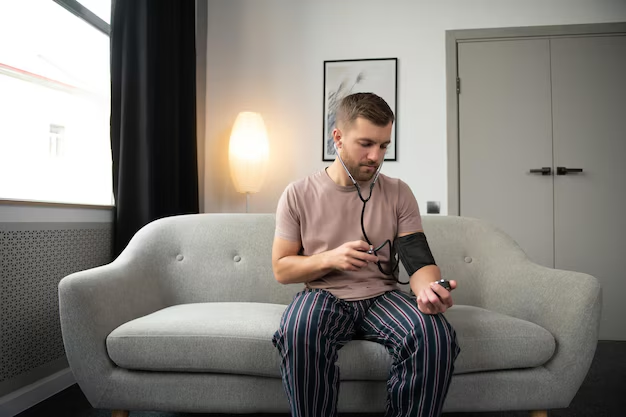Understanding the Connection Between Anxiety and Hypertension: What You Need to Know
Imagine your mind racing with worry and your heart pounding in response. It's no secret that anxiety and stress can take a toll on both mental and physical health. One common concern often raised is whether anxiety can actually cause hypertension, or high blood pressure. While these conditions are prevalent in today’s high-paced world, understanding their relationship is crucial to managing health effectively.
The Basics of Anxiety and Hypertension
Anxiety is a natural response to stress and can be beneficial in some situations. However, when anxiety becomes chronic, it might lead to various health issues. Common symptoms include feelings of nervousness, rapid heartbeat, sweating, and trouble concentrating.
Hypertension, or high blood pressure, is a condition where the force of the blood against artery walls is too high, potentially leading to heart disease, stroke, or other health problems. Blood pressure readings consist of two numbers: systolic (pressure during heartbeats) and diastolic (pressure between beats). A consistent reading of 130/80 mm Hg or higher is considered high blood pressure.
How Are Anxiety and Hypertension Connected?
The Body's Response to Stress
When you experience anxiety, your body undergoes a "fight or flight" response. This automatic reaction involves several physiological changes:
- Increased heart rate: Your heart pumps faster to prepare your body to either flee from or fight the perceived threat.
- Elevated blood pressure: Blood vessels constrict, which raises blood pressure in an effort to provide more oxygen to muscles.
- Hormonal changes: Stress hormones like adrenaline and cortisol flood the system.
These reactions are normal under brief periods of stress. However, when anxiety is chronic, these responses don't subside, potentially resulting in consistently high blood pressure.
Short-term vs. Long-term Effects
It's crucial to separate short-term spikes in blood pressure from long-term hypertension. Anxiety can indeed cause temporary elevations in blood pressure, but it’s unlikely to cause the chronic condition on its own.
The Role of Lifestyle
Individuals who experience anxiety might engage in unhealthy behaviors as coping mechanisms, which can contribute to hypertension. These include:
- Poor diet: Eating foods high in sugar or salt can elevate blood pressure.
- Sedentary lifestyle: Lack of physical activity leads to less efficient circulation.
- Substance use: Cigarettes, alcohol, and caffeine are often used to manage anxiety but can increase blood pressure.
Symptoms and Warning Signs
Recognizing Anxiety
Identifying anxiety isn't always straightforward, as symptoms can vary widely. Common signs include:
- Persistent worry or fear
- Restlessness or on-edge feeling
- Rapid breathing
- Increased heart rate
Recognizing Hypertension
Hypertension is often dubbed the "silent killer," as it might not show symptoms until severe complications arise. Feeling dizzy, having headaches, or experiencing nosebleeds can sometimes indicate high blood pressure, although these are not definitive symptoms.
Impact on Long-term Health
The intersection of anxiety and hypertension can increase the risk of:
- Cardiovascular disease
- Stroke
- Kidney damage
Excessive chronic stress and unmanaged anxiety can exacerbate these conditions, emphasizing the importance of understanding and managing the overlap effectively.
Strategies to Manage Anxiety and Hypertension
Lifestyle Modifications
Some of the most effective methods to control anxiety and reduce hypertension include lifestyle changes:
- Exercise regularly: Physical activity, like walking or yoga, can reduce anxiety and lower blood pressure.
- Healthy diet: Consuming a balanced diet rich in fruits, vegetables, and low-salt options helps.
- Sleep well: Quality sleep is vital in managing both anxiety and blood pressure.
Mindfulness and Relaxation Techniques
Practices like meditation and deep-breathing exercises may ease anxiety symptoms, potentially impacting blood pressure. Techniques such as progressive muscle relaxation and guided visualization can also be effective.
Professional Help
For those struggling to manage anxiety or hypertension, consulting healthcare professionals is key. Therapies or counseling can provide tools to manage anxiety, while doctors can offer medications to control high blood pressure if necessary.
Monitoring and Regular Check-Ups
Regular monitoring of blood pressure can help detect hypertension early. Keeping track of any anxiety exacerbations can also guide individuals and healthcare providers in better managing both conditions.
Final Insight
Understanding the complex relationship between anxiety and hypertension is crucial for maintaining overall health. While anxiety alone may not directly cause chronic hypertension, it can contribute to the condition through lifestyle factors and physiological responses. Effective management through lifestyle changes, mindfulness, and professional intervention can make a significant difference in reducing risks associated with these conditions. Prioritizing both mental and physical health will equip individuals to better handle stress and its ramifications.
Summary: Key Takeaways & Practical Tips
- Mind-Body Connection: Anxiety can cause temporary spikes in blood pressure but doesn’t directly lead to chronic hypertension. 🧠💓
- Lifestyle Impact: Engage in healthy habits – exercise, balanced diet, minimal substance use – to manage blood pressure. 🏃♂️🥗
- Stress Management: Incorporate relaxation techniques like meditation or deep breathing to soothe anxiety and potentially lower blood pressure. 🧘♀️🌿
- Professional Support: Seek medical advice for persistent anxiety or hypertension concerns, considering therapy and medical check-ups as needed. 🧑⚕️💬
- Self-Monitoring: Regularly track blood pressure and be aware of anxiety symptoms to manage both proactively. 📈📝
These strategies not only enhance well-being but empower you to take control over anxiety and blood pressure for a healthier life. 🌟💪

Related Articles
- Are Eggs Bad For Hypertension
- Are Endocrine Disorders Causing Hypertension Rare
- Can Alcohol Cause Hypertension
- Can Allergies Cause Hypertension
- Can Anemci People Get Hypertension
- Can Anemia Cause Hypertension
- Can Antibiotics Cause Hypertension
- Can Asthma Cause Hypertension
- Can Atherosclerosis Cause Hypertension
- Can Birth Control Cause Hypertension
